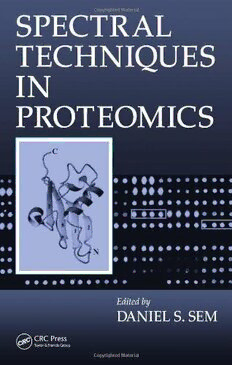Download Spectral Techniques In Proteomics PDF Free - Full Version
Download Spectral Techniques In Proteomics by Daniel S. Sem (Editor) in PDF format completely FREE. No registration required, no payment needed. Get instant access to this valuable resource on PDFdrive.to!
About Spectral Techniques In Proteomics
Facilitating the innovation, development, and application of new spectroscopic methods in proteomics, Spectral Techniques in Proteomics provides a broad overview of the spectroscopic toolbox that can be used, either with proteome or sub-proteome mixtures or with individual/purified proteins studied in parallel. It gives a modest overview of existing and proven techniques as well as a detailed examination of less established spectroscopic methods with studied speculation on future applications. Intended for a broad audience of protein biochemists and biophysicists, the book adopts a wider definition of proteomics to include the systems-based study of proteomes and sub-proteomes involving proteins related through regulatory cascades, metabolic pathways, post-translational modifications, or associated biologic effect, as well as the parallel study of subsets such as proteins with associated protein folds (structural proteomics) or binding sites (chemical proteomics). Beginning by defining the scope of the field as is relevant to spectroscopists, the book then briefly reviews current commonly used spectroscopic methods. It covers separation techniques that typically precede ESI studies as well as MALDI MS/MS based protein identification. SELDI is also presented as a tool that combines separation techniques with MS analysis on the same chip. The book presents studies of protein-protein and protein-ligand interactions using NIR fluorescence, NMR, MS, and SPR. Recent developments in ICAT labeling strategies are addressed along with a discussion of metabolomics. A description of advances in structural proteomics using NMR, x-ray crystallography, and EPR precedes a final summary of current technology and future prospects of the science. Analyzing the current state of the science and the future evolution of the field, Spectral Techniques in Proteomics applies a systems-based approach to studying the function and mechanism of proteins.
Detailed Information
| Author: | Daniel S. Sem (Editor) |
|---|---|
| Publication Year: | 2007 |
| ISBN: | 9781420017090 |
| Pages: | 474 |
| Language: | English |
| File Size: | 18.595 |
| Format: | |
| Price: | FREE |
Safe & Secure Download - No registration required
Why Choose PDFdrive for Your Free Spectral Techniques In Proteomics Download?
- 100% Free: No hidden fees or subscriptions required for one book every day.
- No Registration: Immediate access is available without creating accounts for one book every day.
- Safe and Secure: Clean downloads without malware or viruses
- Multiple Formats: PDF, MOBI, Mpub,... optimized for all devices
- Educational Resource: Supporting knowledge sharing and learning
Frequently Asked Questions
Is it really free to download Spectral Techniques In Proteomics PDF?
Yes, on https://PDFdrive.to you can download Spectral Techniques In Proteomics by Daniel S. Sem (Editor) completely free. We don't require any payment, subscription, or registration to access this PDF file. For 3 books every day.
How can I read Spectral Techniques In Proteomics on my mobile device?
After downloading Spectral Techniques In Proteomics PDF, you can open it with any PDF reader app on your phone or tablet. We recommend using Adobe Acrobat Reader, Apple Books, or Google Play Books for the best reading experience.
Is this the full version of Spectral Techniques In Proteomics?
Yes, this is the complete PDF version of Spectral Techniques In Proteomics by Daniel S. Sem (Editor). You will be able to read the entire content as in the printed version without missing any pages.
Is it legal to download Spectral Techniques In Proteomics PDF for free?
https://PDFdrive.to provides links to free educational resources available online. We do not store any files on our servers. Please be aware of copyright laws in your country before downloading.
The materials shared are intended for research, educational, and personal use in accordance with fair use principles.

